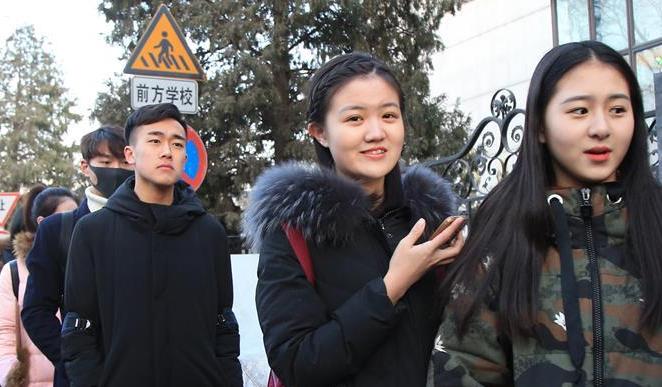


[File photo]
Cherishing the dream of becoming luminaries in the art world, tens of thousands of Chinese students recently sat for the art school entrance exam, which was held nationwide in February. The exam, infamous for its intense competition, has once again attracted attention to China's unique art education system.
On Feb. 8, Beijing Film Academy (BFA) and the Central Academy of Drama (CADCA), two of China’s top-flight art schools, simultaneously kicked off this year's exam. Over 36,000 applicants for CADCA will vie for 577 vacancies, while more than 38,000 candidates will compete for 499 positions at BFA. Both schools have seen an unprecedented rise in their number of applicants this year, the Xinhua News Agency reported.
The exam, also known as "yikao," is usually held in February or March. Students who want to study design, art, drama, theater or film have to take the test before the National Entrance Exam held in June. Art schools also have the power to hold their own more specialized tests.
A shortcut to fame
“I have been preparing for the exam ever since I was a kid. Though the exam is highly competitive, I still want to give it a try,” said Zhang Cheng (pseudonym), a 19-year-old female exam candidate from Zhengzhou, Henan province.
Zhang is far from the only young person with this dream. Due to China’s booming entertainment industry, more and more Chinese students are choosing art school, hoping that a high-quality education can pave the road to fame and success.
Indeed, the exam not only attracts ordinary applicants, but also several young stars who have already received some recognition. Wang Junkai, a 17-year-old pop singer, took part in this year’s exam. Under the hashtag “GoodLuckWangJunKai,” over 3.5 million fans sent good wishes to their idol via Sina Weibo. The page had garnered over 380 million views as of press time.
In response to the tough competition, a representative from CADCA explained to Xinhua that drama-related majors are being increasingly embraced by applicants and their parents, due to the focus on theater education in elementary and middle schools. Thanks to these early programs, many now believe the path offers a promising future.
But not every applicant is able to enjoy an illustrious education. Among 6,148 candidates who have applied to earn a BFA in drama and film performance in 2017, only 25 will be enrolled, yielding an admission rate of only 0.3 percent. In Jiangsu province alone, the number of applicants has surpassed 8,000, one applicant’s mother told People’s Daily.
“Though the chances of being admitted are quite slim, I still want to try. If I can win [a spot], I will have a bright future ahead of me,” said Zhang.
Controversial art education
The furor surrounding the exam has drawn criticism from the public and the media, with some saying that many applicants only dream of wealth and fame--and have no real interest in art.
An online search for "yikao" yields dozens of negative articles, with many touching on corruption and sexual harassment in the application process. The exam has also birthed a booming yet unregulated training course industry in China, imposing extra economic burden on applicants who feel they must pay for extra classes to stand any real chance.
Authorities have also taken note of the issue, with the Ministry of Education raising the minimum score required for admission in 2014. The ministry canceled some individual exams as well, but such moves do little to dampen applicants’ enthusiasm.
“'Artist' is no different from any other occupation. The public should shift its focus from wealthy stars to the quality of art education and art in China, without over-hyping the exam,” said an expert from the Beijing File Association.
 Fire brigade in Shanghai holds group wedding
Fire brigade in Shanghai holds group wedding Tourists enjoy ice sculptures in Datan Town, north China
Tourists enjoy ice sculptures in Datan Town, north China Sunset scenery of Dayan Pagoda in Xi'an
Sunset scenery of Dayan Pagoda in Xi'an Tourists have fun at scenic spot in Nanlong Town, NW China
Tourists have fun at scenic spot in Nanlong Town, NW China Harbin attracts tourists by making best use of ice in winter
Harbin attracts tourists by making best use of ice in winter In pics: FIS Alpine Ski Women's World Cup Slalom
In pics: FIS Alpine Ski Women's World Cup Slalom Black-necked cranes rest at reservoir in Lhunzhub County, Lhasa
Black-necked cranes rest at reservoir in Lhunzhub County, Lhasa China's FAST telescope will be available to foreign scientists in April
China's FAST telescope will be available to foreign scientists in April "She power" plays indispensable role in poverty alleviation
"She power" plays indispensable role in poverty alleviation Top 10 world news events of People's Daily in 2020
Top 10 world news events of People's Daily in 2020 Top 10 China news events of People's Daily in 2020
Top 10 China news events of People's Daily in 2020 Top 10 media buzzwords of 2020
Top 10 media buzzwords of 2020 Year-ender:10 major tourism stories of 2020
Year-ender:10 major tourism stories of 2020 No interference in Venezuelan issues
No interference in Venezuelan issues
 Biz prepares for trade spat
Biz prepares for trade spat
 Broadcasting Continent
Broadcasting Continent Australia wins Chinese CEOs as US loses
Australia wins Chinese CEOs as US loses